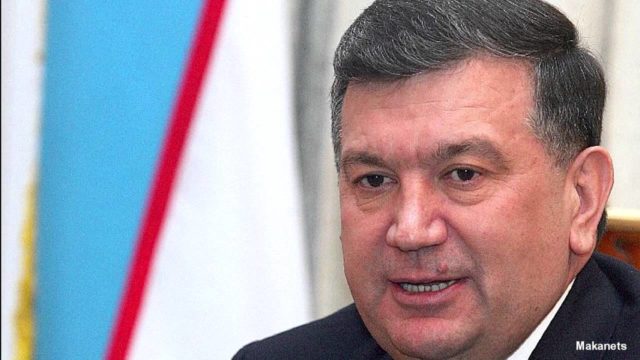
Reform-Minded Presidential Administration Forces Government Reshuffles in Uzbekistan
Publication: Eurasia Daily Monitor Volume: 14 Issue: 3

Incoming presidents put in place their own teams of subordinates and government functionaries; this is true for Uzbekistan as much as for the rest of the world. Since Shavkat Mirziyaev was sworn in as Uzbekistan’s new head of state on December 14, 2016, he has demoted, promoted or rehabilitated a number of his former colleagues to create his new governing team. Previously, as the interim president for about three months following the death of Islam Karimov, he replaced some regional leaders and heads of government-owned businesses; but after being officially elected president, he has moved to undertake a major governmental reshuffle.
President Mirziyaev’s first new high-level appointment was to nominate Abdulla Aripov to serve as prime minister—Mirziyaev’s previous post before becoming president. Aripov worked as a deputy prime minister for ten years before he fell out of Karimov’s good graces in 2012 and was sacked over allegations of corruption (BBC—Uzbek service, December 15). This departure was supposedly unfair and motivated by trumped-up claims (BBC—Uzbek service, December 16). Mirziyaev most likely also feels that Aripov was removed unfairly: he went on to describe his nominee for prime minister as an independent decision-maker, well-respected by the population and, most importantly, someone whom he had vetted in the past (Kun.uz, December 16, 2016).
The man heretofore occupying the deputy prime minister position, Rustam Azimov, enjoyed close personal relations with the late Islam Karimov, and he was well known both inside and outside Uzbekistan. And yet, despite widely held expectations that he would be named the next prime minister, Azimov was not nominated to head the Cabinet (BBC Uzbek Service, December 10). Furthermore, Azimov has now lost his job as first deputy prime minister—which was the third-most-important position in the government after then-president Karimov and then–prime minister Mirziyayev. Azimov’s post will instead be filled by Achilboy Ramatov, until now the chair of the Uzbekistan Railroads stock company (Uzreport, December 15). Azimov has also lost his job as minister of finance, having been reassigned in the new Cabinet to the post of deputy prime minister for macroeconomic development and foreign investments (Gov.uz, accessed January 17).
As prime minister, Mirziyaev was infamously focused almost exclusively on domestic affairs, paying little or no attention to international relations. Therefore, his decision to appoint Aripov instead of Azimov to replace him as head of government is not that surprising. While Mirziyaev probably never joined any Uzbekistani delegations on foreign visits, Rustam Azimov has represented his country abroad in an official capacity on several occasions. Therefore, Mirziyaev likely wanted someone in the prime minister position who would be well versed in domestic issues and who would stay focused on them.
Uzbekistan’s security structure is undergoing changes at the top as well. President Mirziyaev has not only replaced the latest minister of interior affairs with now the fourth minister in the past 25 years, but he also invited the previous ministers to rejoin the government (Gazeta.uz, January 4, 2017). That includes Zokirjon Almatov, minister of interior affairs during 1991–2005. Almatov will head a newly created commission to fight corruption. Furthermore, Bakhodir Marlyubov, who replaced Almatov as interior minister in 2006–2013, will now lead the ministry’s academy (Kun.uz, December 20, 21, 2016).
The return of Zokirjon Almatov to the government is unexpected given that he used to share—or some observers even say “compete for”—control over domestic security with Rustam Inoyatov, who has headed the National Security Service since 1995. Almatov honorably retired from the Ministry of Interior Affairs in 2005, but there is speculation that his departure was actually related to the violent 2005 Andijan disturbances and the way his forces responded to the crisis (Lenta.ru, February 5, 2014). If the past tensions between the two security heads are true, the recent reported demotion of Inoyatov’s first deputy, Shuhrat Gulyamov, combined with Almatov’s return could perhaps signal a shift in the power balance within Uzbekistan’s security structures (Ozodlik, January 7).
Since gaining independence, Uzbekistan chose a slower pace of privatization compared to the more aggressive pace chosen by neighboring Kazakhstan. As a result, Uzbekistan has spawned fewer oligarchs. Nevertheless, a handful exist who are well known to any Uzbekistani. One of them is Salim Abduvaliev, popularly referred to as “Salimboy” (“Salim the Rich”). His purported ability to influence top government officials and his role in Uzbekistani politics is infamous, intertwining myths with reality (Ozodlik, news and audio interview, January 6). Now, under the Mirziyaev administration, Salimboy has been appointed deputy chair of the National Olympics Committee of Uzbekistan.
The current government reshuffles should logically be understood in the context of President Mirziyaev’s apparent serious desire to initiate sweeping domestic reforms. Although he headed Uzbekistan’s Cabinet of Ministers for the past 13 years, earlier this month he nevertheless made clear how unsatisfied he is with almost every governmental department: Mirziyaev rebuked by name every sitting top official, only sparing the new prime minister (Kun.uz, January 8; Gazeta.uz, January 16). But although Mirziyaev appears to be pursuing a comprehensive overhaul of the system, he seems determined to achieve this without initiating any major political-administrative disruptions. Thus, for now, he is relying on current government employees, on the condition that they change their approach to their duties; additionally, he is rehabilitating past government functionaries who might still hold some weight and experience needed for his reforms. Comprehensive reforms are a long-term endeavor, and therefore the recent government reshuffles are probably just the beginning. But for these reforms to be successful, Mirziyaev cannot be the only one who wants such changes.



